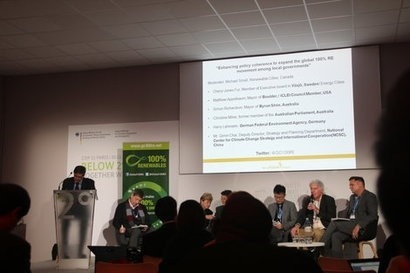
The European Committee of the Regions believes that the agreement, successfully negotiated in Paris on 12th December, offers a real glimmer of hope for the world, although it will still not be enough to avert irreversible consequences from climate change. However, the agreement has increased the importance of cities and regions as part of an effort to counter climate change and make the global energy sector cleaner and greener.
The Committee of the Regions is the EU's assembly of local political leaders. Ahead of the COP 21 talks it had urged national governments to agree not to add carbon to the atmosphere after 2050 and had pressed the EU to cut greenhouse gases by 50 percent by 2030 (compared to 1990 levels). It also wanted the COP21 negotiators to decide to draw up an Action Plan for cities and regions. Unfortunately, these three goals proved overly ambitious.
“However, Europe's cities and regions take hope from the deal, above all because it is legally binding and because two important goals of the CoR were achieved” said Markku Markkula, President of the Committee of the Regions. “The agreement – for the first time – recognises the role of local governments in fighting climate change, and developed economies have made a commitment to provide $100 billion each year after 2020 to support developing countries' climate actions. These are significant achievements. The result – an agreement to keep climate change 'well below' 2 degrees, with an aim of 1.5 degrees – is better than many thought possible and provides real potential for us to build on.”
Francesco Pigliaru, President of Sardinia and Chairman of the CoR's environment commission, added that unfortunately the agreement does not include cities and regions within the system of governance of climate policies, a decision that will reduce the quality of policymaking and implementation. Europe's local governments will try to compensate for this weakness through even greater mobilisation and coordination of efforts, by using existing partnerships and mechanisms. Thus far, cities and regions have been the most ambitious members of NAZCA (Non-State Actor Zone for Climate Action), a United Nations platform that registers commitments to climate action by sub-national authorities, companies, civil society and investors. Going forward, they will have to take around 70 percent of the measures needed to reduce climate change and 90 percent of measures to adapt to climate change, according to Annabelle Jaeger, a member of the Regional Council of Provence-Alpes-Côte d'Azur and a member of the CoR's delegation in Paris.
“Local government should therefore have a bigger say in deciding exactly what measures are taken and in shaping national and international policies” said Ms Jaeger.
In other COP 21 news, the European Commission has committed extra funds to help the Covenant of Mayors, a voluntary climate initiative of regions and cities, move beyond its base in Europe and become a global movement.
For additional information:

